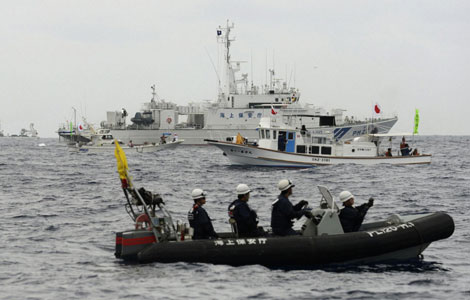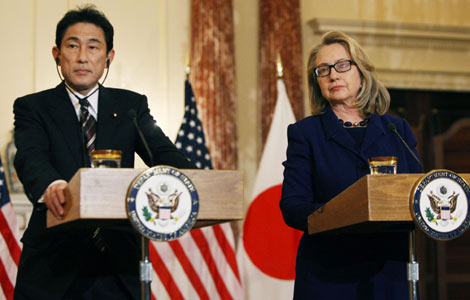Diaoyu Islands 'have never been Japan's territory'
[2013-05-27 03:25]The 1945 Potsdam Proclamation, a statement of terms for the unconditional surrender of Japan issued in the names of the United States, China and the United Kingdom, determined that the terms of the Cairo Declaration shall be carried out, including that China’s northeast regions, Taiwan Island, Penghu Islands and its surrounding islands, should return to China.
Tokyo faces a dilemma of sorts
[2013-03-04 07:51]In a speech titled "Japan is back", during his visit to Washington, Japanese Prime Minister Shinzo Abe pledged to reinvigorate Japan's economy and said: "Japan is not, and will never be, a tier-two country."
Standoff over Diaoyu Islands
[2013-01-26 07:36]Tensions between China and Japan over the Diaoyu Islands dispute have escalated after the recent incidents involving the two countries' vessels and planes.
US sends wrong signal over islands issue
[2013-01-21 09:53]US Secretary of State Hillary Clinton on Friday claimed that the Diaoyu Islands were under the administrative authority of Japan, and therefore the US-Japan Security Treaty applies to it.
Unwise foreign policy turns Japan into own enemy
[2013-01-11 14:36]The Japanese economy, under the burden of years of deflation and an aging population, has been the "Patient of Asia" for the last two decades.
Easing tension over islands
[2012-12-26 17:41]Kitera's primary task is clearing up the mess caused by the Japanese government's "purchase" of China's Diaoyu Islands, which has triggered the worst bilateral tension in decades.
Bridge over troubled waters
[2012-12-26 09:17]Despite his emphasis on using deterrence against China, Abe should look for room to negotiate with China to resolve the issue peacefully.
Japan still haunted by idea of militarism
[2012-12-20 08:06]Japan prides itself on its sense of history. But the lessons of its past remain fundamentally unabsorbed.
Concern over Abe's moves
[2012-12-18 07:58]With an already fraught Sino-Japanese relationship, Japan's conservative Liberal Democratic Party's return to power commands concern.
Japan sets alarm bells ringing
[2012-12-11 07:50]Sino-Japanese relations have perhaps hit the lowest point this year, coinciding with the 75th Anniversary of the Nanjing Massacre that falls on Dec 13.
Don't play with fire on Diaoyu Islands issue
[2012-12-04 17:08]The US should appear as a cooperator, rather than an intruder, in its return to the Asia and Pacific.
Japan 'should not deny history'
[2012-11-05 08:03]Chinese diplomats asked Japan not to deny history, as Chinese ships continued to conduct regular patrols to defend China's sovereignty over the Diaoyu islands.

